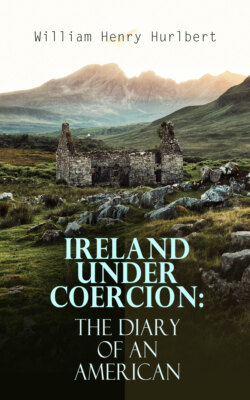Читать книгу Ireland under Coercion: The Diary of an American - William Henry Hurlbert - Страница 9
На сайте Литреса книга снята с продажи.
III.
ОглавлениеTable of Contents
In a very remarkable letter written to Earl Grey in 1868, after the Clerkenwell explosions had brought the disestablishment of the Irish Protestant Church into Mr. Gladstone’s scheme of “practical politics,” the Archbishop of Westminster, not then a Cardinal, called the attention of Englishmen to the fact, not yet I fear adequately apprehended by them, that “the assimilating power of America upon the Irish people, if seven days slower than that of England in reaching Ireland, is sevenfold more penetrating and powerful upon the whole population.” By this the Archbishop meant, what was unquestionably true, that even in 1868, only twenty years after the great Irish exodus to America began, the social and political ideas of America were exerting a seven-fold stronger influence upon the character and the tendencies of the Irish people than the social and political ideas of England. Thanks to the development of the cables and the [pg xxxviii] telegraph since 1868, and to the enormous progress of America since that time in wealth and population, this “assimilating power” reaches Ireland much more rapidly, and exerts upon the Irish people a very much more drastic influence than in 1868. This establishes, of course, a return current westward, which is as necessary to he watched, and is as much neglected by American as the original eastward current is by British public men.
In this letter of 1868 to Earl Grey, the Archbishop of Westminster desiring, as an Englishman, to counteract, if possible, this influence which was drawing Ireland away from the British monarchy, and towards the American Republic, maintained that by two things the “heart of Ireland” might be won, and her affections enlisted with her interests in the support of the unity, solidity, and prosperity of the British Empire. One of these two things was “perfect religious equality between the Catholics and the Protestants of Ireland.” The other was that the Imperial Legislature should by statute make it impossible for any landlord in Ireland to commit three wrongs—“first, the wrong of abusing his rights by arbitrary eviction; secondly, by exacting an exorbitant rent; thirdly, by appropriating to his own use the improvements effected by the industry of his tenants.”
Perfect religious equality has since been estab lished between the Catholics and the Protestants of Ireland. The three wrongs which the Archbishop called upon the Imperial Legislature to make impossible to Irish landlords have since been made impossible by Statute.
Yet it is on all hands admitted that the “unity, solidity, and prosperity” of the British Empire have never been so seriously threatened in Ireland as during the last ten years. Was the Archbishop wrong, therefore, in his estimate of the situation in 1868? Or has the centripetal influence of remedial British legislation since 1868 failed to check a centrifugal advance “by leaps and bounds,” in the “assimilating power” of America upon Ireland?
